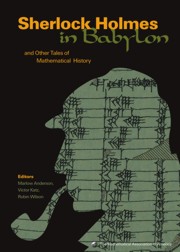Book contents
- Frontmatter
- Introduction
- Contents
- Ancient Mathematics
- Medieval and Renaissance Mathematics
- The Seventeenth Century
- The Eighteenth Century
- Foreword
- Brook Taylor and the Mathematical Theory of Linear Perspective
- Was Newton's Calculus a Dead End? The Continental Influence of Maclaurin's Treatise of Fluxions
- Discussion of Fluxions: from Berkeley to Woodhouse
- The Bernoullis and the Harmonic Series
- Leonhard Euler 1707–1783
- The Number e
- Euler's Vision of a General Partial Differential Calculus for a Generalized Kind of Function
- Euler and the Fundamental Theorem of Algebra
- Euler and Differentials
- Euler and Quadratic Reciprocity
- Afterword
- Index
- About the Editors
Euler's Vision of a General Partial Differential Calculus for a Generalized Kind of Function
from The Eighteenth Century
- Frontmatter
- Introduction
- Contents
- Ancient Mathematics
- Medieval and Renaissance Mathematics
- The Seventeenth Century
- The Eighteenth Century
- Foreword
- Brook Taylor and the Mathematical Theory of Linear Perspective
- Was Newton's Calculus a Dead End? The Continental Influence of Maclaurin's Treatise of Fluxions
- Discussion of Fluxions: from Berkeley to Woodhouse
- The Bernoullis and the Harmonic Series
- Leonhard Euler 1707–1783
- The Number e
- Euler's Vision of a General Partial Differential Calculus for a Generalized Kind of Function
- Euler and the Fundamental Theorem of Algebra
- Euler and Differentials
- Euler and Quadratic Reciprocity
- Afterword
- Index
- About the Editors
Summary
The vibrating string controversy involved most of the analysts of the latter half of the 18th century. The dispute concerned the type of functions which could be allowed in analysis, particularly in the new partial differential calculus. Leonhard Euler held the bold opinion that all functions describing any curve, however irregular, ought to be admitted in analysis. He often stressed the importance of such an extended calculus, but did almost nothing to support his point of view mathematically. After having been abandoned during the introduction of rigor in the latter part of the 19th century, Euler's ideas began to take more concrete form during the early part of the 20th century, and they have now been incorporated into L. Schwartz's theory of distributions.
The algebraic function concept
Euler's radical stand in the dispute over the vibrating string is surprising since he had canonized the narrower range of analysis which his main opponent, J. B. R. d'Alembert (1717–1783), adhered to. This was done in the influential book Introductio in analysin infinitorum [12], in which Euler chose to determine the relation between the variable quantities by way of functions instead of using curves, as had been universally done earlier (cf. [22]; and [7]). He defined a function as follows (see photo on the next page):
A function of a variable quantity is an analytical expression composed in one way or another of this variable quantity and numbers or constant quantities [12, ch. 1, §4].
- Type
- Chapter
- Information
- Sherlock Holmes in BabylonAnd Other Tales of Mathematical History, pp. 354 - 360Publisher: Mathematical Association of AmericaPrint publication year: 2003

